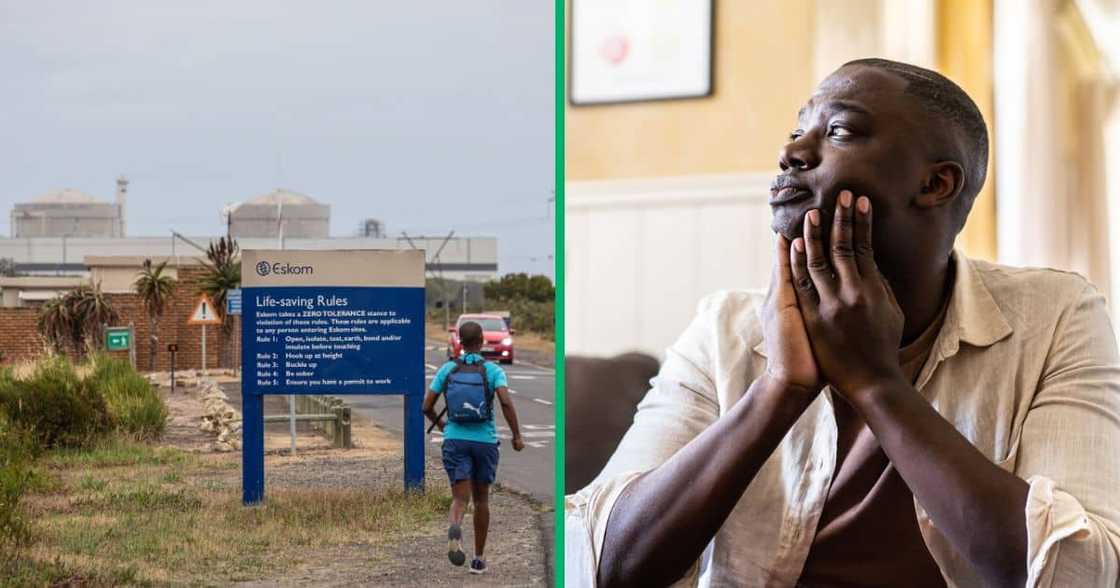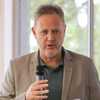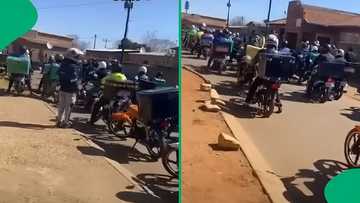Eskom’s Koeberg Unit 1 Closer to Being Restored Online, but SA Livid at Loadshedding Continuing
- Eskom announced that Koeberg's Unit 1 had completed a load rejection test
- This test is said to bring the unit one step closer to being able to generate electricity
- Wits University's economist Dr Kenneth Creamer gave Briefly News his views on what this could mean for the economy
- South Africans roasted Eskom and pointed out that the test completion made no difference to the daily loadshedding
Tebogo Mokwena, Briefly News's current affairs journalist, offered coverage of current affairs like loadshedding and environmental affairs during his seven years at Daily Sun and Vutivi Business News.

Source: Getty Images
Eskom was excited to announce that Koeberg's Unit 1 completed a full load rejection test, which is the final step to ensuring that it regains its generative power. South Africans quickly shut the utility's energy down and expected to know how loadshedding was happening despite such a development.
Koeberg completes load rejection test
Koeberg station in the Western Cape is expected to have one unit returned to service after it was disconnected from the national grid. According to eNCA, new steam generators were installed, and the government encouraged Eskom to plan on testing unit 2 to return to action and provide the country with much-needed electricity. A load rejection test occurs when a system is tested to see if it can handle the sudden load loss. Eskom's X, formerly Twitter, account @Eskom_SA shared the news with Mzansi. Read the tweet here.
PAY ATTENTION: Briefly News is now on YouTube! Check out our interviews on Briefly TV Life now!
Economist Dr Kenneth Creamer shares views with Briefly News
Dr Kenneth Creamer, an economist at Wits University, told Briefly News that Koeberg is not yet ready to be fully online.
"The Koeberg life extension project was originally approved by Eskom in 2010 at a projected cost of R20 billion, but the project has fallen behind schedule and is likely to be significantly over budget, although the full updated cost of the project is not yet known.
"The fact that, due to the life extension project, one unit of Koeberg’s units has been offline for some months has contributed to South Africa’s electricity shortage and loadshedding crisis during 2023, a situation exacerbated by the poor performance of many plants in Eskom’s coal fleet. This situation will likely continue in 2024 as Koeberg continues to provide electricity from one unit at a time for the next year or two.
Depending on the National Nuclear Reactor’s decisions and other factors, it is also possible that both Koeberg units will have to be offline simultaneously for some time. If this happens, this will mean less electricity generation for South Africa and will put additional pressure on the electricity system with well-known negative implications for South African households, firms, investment and job creation," he said.
South Africans not pleased
Netizens were incensed and thoroughly roasted Eskom on a bed of hot coals.
Maki Marish asked:
“What happened to loadshedding will be over by December 2023?”
Phaahle pointed out:
“We’re supposed to believe that loadshedding is a real issue.”
Matthe Kanniah joked:
“Consistency without fail. Reliable disruptions. I love that you guys never let us down with disappointment.”
Vho elon Masakhane pointed out:
“But let’s be honest: it’s January, and your engineers drank all their money, after which they sabotaged the systems to get loadshedding overtime pay.”
Goolam added:
“It’s impossible for so many breakdowns all at once. Call it what it is: sabotage. This is just the start. People associated with Zuma will intensify efforts to sabotage you.”
Paul Mathai was unimpressed.
“Back to the rubbish.”
PhotographicFloridian:
“Electric is overrated anyway.”
Eskom's Kusile Unit 1 synchronised online
In a related article, Briefly News reported that Eskom's Kusile Unit 1 was synchronised to the system and went online on New Year's Eve.

Read also
Exclusive: Wits University economist Dr Kenneth Creamer expresses hope about the unemployment rate
The unit is expected to add more megawatts to the system to the tune of 800MW, which is supposed to reduce the pressure of loadshedding. South Africans did not believe Eskom and continued to anticipate loadshedding in intensity.
PAY ATTENTION: Сheck out news that is picked exactly for YOU - click on “Recommended for you” and enjoy!
Source: Briefly News

Tebogo Mokwena (Current Affairs editor) Tebogo Mokwena is the Deputy Head of the Current Affairs desk and a current affairs writer at Briefly News. With a Diploma in Journalism from ALISON, he has a strong background in digital journalism, having completed training with the Google News Initiative. He began his career as a journalist at Daily Sun, where he worked for four years before becoming a sub-editor and journalist at Capricorn Post. He then joined Vutivi Business News in 2020 before moving to Briefly News in 2023.

Dr Kenneth Creamer (Senior Lecturer School of Economics and Finance at Wits University) Dr Kenneth Creamer is a senior lecturer at Wits University's School of Economics and Finance. He has published academic and policy-related articles on economic policy, international economics, macroeconomics, and the energy transition.



